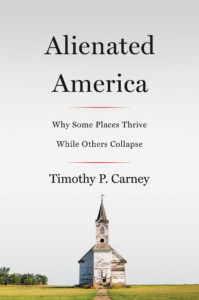Why Do Some Places Thrive and Others Collapse?
In his opening presidential campaign speech, Donald Trump declared, “The American Dream is dead,” thus launching his campaign theme: Make America Great Again. This belief in the American Dream’s death was the “defining characteristic” of Trump’s enthusiastic Republican primary support, journalist and conservative commentator Timothy Carney soon realized, as he described in a recent interview with the American Communities Project.
In 2016, Carney set out to understand why the American Dream seemed dead to so many. He knew the widely discussed explanations: factory closures, more equal rights for women and minorities, old white men angry about losing their privilege.
Carney’s new book, full of personal stories and studies, is the product of his search for answers. Alienated America: Why Some Places Thrive While Others Collapse reveals how an invigorated community is the backbone of the American Dream. In his journey through America, Carney uncovered that “places collapse if they are not planted with institutions of civil society that connect people together and provide a sense of purpose. The places that thrive have those institutions, and in America, for the middle class, those institutions are mostly church,” as he put it in our interview.
Read on for more highlights of Carney’s research, his viewpoint shifts, and his ideas for rebuilding civil society. (Click on the anchor links below to jump to specific points of our interview.) Listen to the full, 34-minute interview.

Tie Between Social Capital and 2016 GOP Primary Vote
Map of Social Capital
How Factory Workers’ Skills Relate to Family Formation
Mancamps in Fracking Towns: A Natural Experiment
Biggest Surprises in Research — It Takes a Village
Where Education Fits In
Impact on Young People
Casting Findings After 2018 Midterms
Recommendations for Reinvigorating Civil Society
What Media Miss About Trump Supporters in Depressed Places
Providing Helpful Reporting for 2020 Election
How to Reach Out to Alienated America in 2020 Campaign
Feelings About the American Dream Now
Tie Between Social Capital and 2016 GOP Primary Vote
When I talk about Trump support in the book, I’m almost always talking about the Republican primaries. In the general election, there’s two choices; there’s so many confounding factors. But when there are 17 people on the ballot, for those choosing Donald Trump, my hypothesis was it was an expression that the American Dream was dead. It was borne out by the data in Iowa — the counties with the best measures of social capital were Trump’s worst counties. And Trump’s best counties were the counties with the lowest measures.
Two of the most educated counties in America are in Iowa, and they were two of Trump’s worst counties in the whole country. But Sioux County — where everybody is Dutch (they’re Dutch reformed); they go to church twice on Sundays; there’s two Dutch reformed colleges — was Trump’s worst county in Iowa by far. The other bad counties were where Des Moines is, where Iowa State is, where the University of Iowa is.
His best big county was Pottawattamie County, which is where Council Bluffs is. The Trump contingent — a huge number of first-time attendees — didn’t even have a leader. Jeb Bush had a precinct captain in every precinct there, even if he’s only getting five supporters in a precinct. Trump had the most people in that room in Pottawattamie County, but then they sort of disbanded at the end. Pottawattamie has the worst social capital scores of any big county in Iowa.
How Factory Workers’ Skills Relate to Family Formation
I call this the Joe Adams Effect. In 2005, there was a factory in Bloomington, Indiana, shutting down. I stopped by the union hall, and Joe Adams, the vice president, was losing his job. I asked him how he got into factory work. He said, ‘I was kind of surprised when I first wanted a factory job; they asked me if I had experience.’ Joe responded: ‘What do I need experience for? This is unskilled labor, right?’ You pick up a tool, you drive in a rivet, and then you do it again.
And they said, ‘You know what we want from experience? We want to know: Do you show up on time? Do you wait until the whistle to take your lunch, come back before lunch is over, and then stay until the whistle? Do you only call in sick when you’re actually sick? And are you willing to stick around and do this mundane thing for decades?’
This was 2005 — before I was married and had kids. Thinking about Joe Adams years later, I realized this is a prerequisite for being a dad. Can you show up on time, stay for as long as you’re needed, pick up basic unskilled tasks like changing a diaper and not burning the scrambled eggs and commit yourself to something that at times might be crazy-making for decades?
I realized factories cultivated these skills of the unskilled. You could call them basic virtues, and places that lost those factories lost a training ground for those virtues. If you go to college, if you go to a high school that expects you to go to college, a lot of those same things are there, while for the working class, the factory was the prime training ground. I included that because the data show that the retreat for marriage in America is mostly happening in the working class. And one of my explanations is that the loss of the factory job has meant less cultivation of those basic virtues.
Mancamps in Fracking Towns: A Natural Experiment
The mancamp is this warren of trailers and the rooms are fairly nice. It’s a flat-screen TV, a nice bed, good lighting; you are sharing a bathroom but only with three other people. Then there’s these massive quadruple wide trailers with ping pong tables, all you can eat fast-food, 24-hours a day, and big screen TVs for watching the game. It was dude-heaven.
In Williston, North Dakota, they effectively had to import lots of workers, but they also had to pay them a lot of money. It was $18 an hour for unskilled labor. If you had a commercial driver’s license, you were making six figures because this is fracking central.
But there was a study of these various fracking communities because what was the rare thing going on here: blue-collared guys getting a lot of money. So if we saw the loss of these good factory jobs preceded the retreat from marriage among the working class, the return of good jobs for the people without a college education should hopefully bring a return to the marriage and family formation. It didn’t happen in Williston, and it didn’t happen in these other fracking towns, as studied by Melissa Kearney at Brookings.
For me, the lesson of Williston was this isn’t a real human community. You are giving labor and they’re giving you money, which may sound like what all work is, but most jobs are different. They’re more relational. Most places are geared towards family formation.
Biggest Surprises in Research — It Takes a Village

One of the things that surprised me most is that I would find the phrase it takes a village to raise a family to not only be true but profound. This was, of course, Hillary Clinton’s book title, and to me as a conservative, it sounded like some collectivist thing.
A lot of my individualism faded away while writing this. As a parent, I never thought my wife and I were doing this on our own. But realizing that it wasn’t just that we relied on this help but that the whole undertaking of family formation requires this support structure of a community of multiple institutions.
For other conservative friends, one of the most surprising things is that the liberal elites practice what we social conservatives preach. They finish school. They get a job. They get married. They stay involved in their kids’ lives. I address in the book what I call the Lena Dunham Fallacy: this belief that liberal elites, college-educated elites, are all graduating from Wesleyan and then never getting married, and if they have children, it’s deliberately out of wedlock with no regard for the traditional family. That’s not the way it works.
One of the places I go in the book, Chevy Chase, Maryland, about 10 miles from my house, is overwhelmingly Democratic. It’s overwhelmingly wealthy and educated. If you go to a place like Chevy Chase, you will see them living the traditional family life: finishing school, getting a job, getting married, having kids, staying married — divorce rates in these circles are lower than average by far — and being involved in their kid’s life, coaching T-ball, and even going to church at a higher rate than I would have suspected.
Where Education Fits In
One of the places people thought I would talk more about was education, but I see school as being another institution of civil society, not dramatically different. When people say, ‘Oh, I’m going to send my kids to a good school,’ it doesn’t primarily mean that there’s some extra skilled teachers there or more technology. It means the other parents are very involved in the school. And so school can be a very strong institution of civil society, but it’s only in certain communities.
It’s a little depressing because it means there’s no easy fix. You can’t snap your fingers or pass a new funding bill and create a ton more intact families and involved parents in a school district. There’s deeper systemic things that have to do with the strength of community.
Impact on Young People
Across the board, the data show worse outcomes for people who grow up in places with worse social capital and weaker communities. Raj Chetty is a researcher who found that the No. 1 predictor of upward mobility by children was the number of intact families locally. And No. 2 was measures of social capital.
One of the things I remember from Uniontown, Pennsylvania, was talking to this couple saying, ‘We’re going to beat this place,’ meaning we’re going to be successful, stay married, and raise our kid. They’re trying to overcome the culture in a way that I never felt particular counter-pressure.
Casting Findings After 2018 Midterms
In 2018, notably Democrats did well in places Trump had won in the Rust Belt or working-class places. Trump had won Pennsylvania and Michigan and Wisconsin, and in all three of those states, Democrats won all the big statewide races.
I actually predicted this in a New York Times piece I wrote ahead of the election. I said some people thought Trump had brought about a realignment, bringing working-class communities into the Republican Party. He certainly didn’t do that. I mean the Republican Party still stands for certain ideas: lower taxes, pro-life, Christian conservative things; that’s not the agenda of the American working class.
But more importantly, I thought the vote for Trump was a vote that the American Dream was dead. And some of the very same people were saying the same thing when they voted for Obama, especially in 2008 and also in 2012. So I wasn’t surprised to see counties in Michigan go Obama, then Trump, and then go Democrat again in 2018. It’s not an ideological expression of their vote as much as it is an expression that things are thoroughly broken all the way to the bottom.
Recommendations for Reinvigorating Civil Society
It has to happen on the local level. The last chapter doesn’t have a lot of big federal legislation that can solve it because there’s no Restore Local Institutions of Civil Society bill.
But on the community level, anybody who is near the top of an institution that has any stability should just say wait a second: We are the ones who are going to help people’s lives be better. If you’re running a church in Fayette County, Pennsylvania, you have to think what I thought was the job of some government agency, or what I thought was the job of a nonprofit geared towards helping drug addicts, is my job. Not to just necessarily provide the acute treatment but to build an infrastructure. If you want people to get married, you can’t preach to them about the importance of marriage. You have to build the culture, a society, where there’s support and modeling for that.
A lot of it is on an individual level: Go to church and start a T-ball team. Even while writing this book, I started a T-ball team and coached kindergarten girls basketball and saw a positive value for myself and others.
We have to get rid of, weaken, or reform those policies that kill institutions or try to back them into corners. Sometimes there are people who don’t like the idea of churches and religious organizations getting involved. They say, ‘Your job is to lead worship and spirituality; stay out of civil society.’ I would like to tell people who disagree with religious institutions, OK, but let them do their good work without trying to interfere with them because that is going to be the backbone of the American Dream.
On a secular level, it would be a big gain for counties and states to move control of schools to as local a level as possible. People always ask me, ‘Are there secular things I can do what you talk about the churches doing?’ And I say, ‘Yeah.’ I’m from New York, and I know places in New England where the local schools really are controlled by the town. So then they become these defining institutions. The high school where I grew up was what made our town our town, and we had control over it.
In my current county, Montgomery County, Maryland, there’s no local control over the schools. It’s run by the county, which runs a dozen schools. Give people control over their community. That gives them a sense of purpose, the modeling, and the safety net to allow them to have the infrastructure around which you build a good life. That would be one public policy proposal that states and counties can carry out.
What Media Miss About Trump Supporters in Depressed Places
I think they’re missing the fact that it’s a local phenomenon, it’s a cultural phenomenon, and it’s a very real phenomenon.
Some people will chalk up it to pure economics. That’s what the populists on the right say sometimes: The steel jobs are lost. The oversimplification on the left is to say it’s cultural anxiety and then skip ahead to say, ‘Oh, this is just backwards and bigotry’ and that sort of thing.
What they’re both missing is the nature and the depth of the loss, that it’s not just that the factory shut down. It’s after the factory shut down, one of the churches had to shut down, and that people then didn’t go to the next church over, and they stopped going to church, and the coffee shop where people meet shut down.
Providing Helpful Reporting for 2020 Election
Looking beyond the purely economic explanations is the first step. And trying to deal with people on their own terms; there’s this bad habit in the press when somebody says something to respond with, ‘Oh, so what you’re saying is…’ and filling in the blanks.
Those are the two types of reporting we’ve had: People who just tried to give a purely economic account for it, or people who, when they gave a cultural account for the suffering, chalked it up to bigotry instead of alienation.
It’s tricky because I find people who live in places that have really suffered under alienation often love where they live, and will be very protective of it, and then can open up to lamenting how it doesn’t have what it needs to have and what it used to have.
Sometimes if I showed up and said, ‘I came to your county because by all measures it’s falling apart,’ they’ll say, ‘You have no idea what you’re talking about. We’re great.’ And then within an hour they’re telling me about how there aren’t these strong bonds. So listening and understanding the complex messages was a much harder undertaking than you might first imagine.
How to Reach Out to Alienated America in 2020 Campaign
It’s tricky because one of the things that made Trump appeal was articulating the pain that people suffer. And that will always be step one. I thought Hillary Clinton was incredibly tone deaf to go to Michigan right before the election and say, ‘The American Dream is alive and well as it’s ever been.’ How does that sound to somebody who remembers a strong town where people had a real ladder, and access to climb up the ladder, and now they don’t?
Trying not to demean and diminish their actual suffering would be the first way to acknowledge that this is real and that the roots of it are not purely economic. And to acknowledge that the repair is going to happen at the community level and that what you as a presidential, senatorial, or congressional candidate can do is provide some support but also make sure that nobody is interfering with people’s ability to build.
Feelings About the American Dream Now
What makes me feel more hopeful is that it’s not that our souls have gotten worse or anything. Looking at middle-class places, like Oostburg, Wisconsin, or Orange City, Iowa, I saw places that on a material level don’t have much more than the real alienated places. But they’ve built and maintained very strong church communities, so that’s made me think we don’t need to totally change the U.S. economy. We don’t need to change the character of Americans in order to turn things around. We need to figure out how to plant and make stick strong institutions in the places that are currently suffering from alienation.
